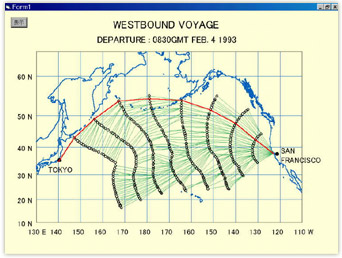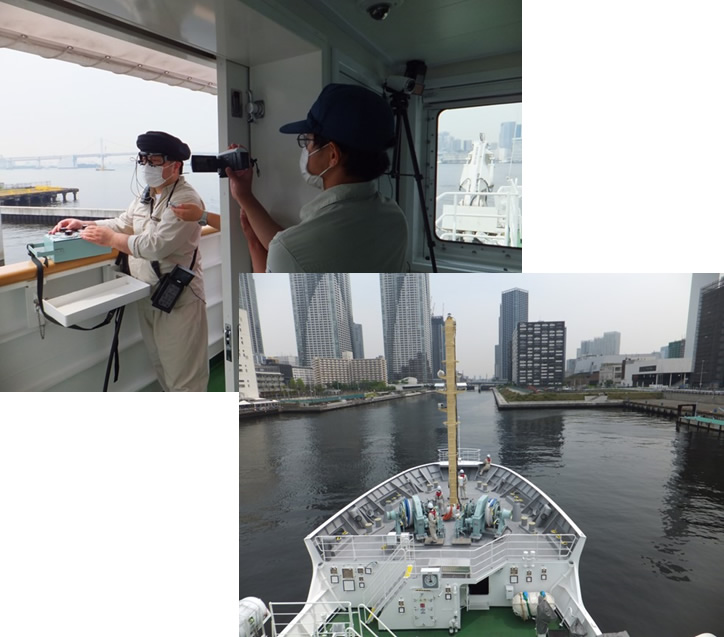Overview
In order to safely and efficiently operate ships, which are the mainstay of marine transportation, we conduct research on the design, management, and operation of information systems using maritime and maritime information, such as next-generation ship operation management using ship-to-shore communications, ship collision avoidance and port traffic management using advanced information technologies such as electronic charting and automatic identification system (AIS), remote sensing at sea, optimal route selection methods, and equipment management methods. We conduct research on the design, management, and operation of information systems using maritime and maritime information such as ECDIS (Electronic Charting and Data Interchange System) and AIS (Automatic Identification System).
Lecture Methods
You can learn how to quantitatively evaluate what information is measured and processed by computers in ship navigation, and to what extent the information output from computers improves the safety and economy of navigation. Many experiments are conducted at sea, allowing students to conduct practical research that is not biased by theory.
Attractiveness
You can study in depth the state-of-the-art information processing technology used in ship navigation. The damage to the environment caused by collisions, groundings, and damage to ships due to rough weather is immeasurable. Research and development of navigation systems that support safe ship operations is an important issue.
Staff
| Instructor | Title | Research Area | Course Title | |
|---|---|---|---|---|
| Kyoko KANEMOTO | Professor Dr. | Insurance Law, Maritime Law, Industrial Accident Compensation Insurance Act, Automated Driving System and the Law | IT Business and Civil Liability, Seminar on IT Business and Civil Liability |
|
| Jun KYAHANO | Associate Professor | Navigation, Decision making in collision avoidance, Optimal Maneuvering | Advanced Navigation Information | |
| Hayato KONDO | Professor | Intelligent Ocean Robots such as Autonomous Underwater Vehicles and Unmanned Surface Vehicles, Intelligent Systems, Information Technology, Control Engineering | Underwater Technology Experiments on Underwater Technology |
|
| Hitoi TAMARU | Professor | Navigation, Marine Traffic, Optimal Control | Advanced Navigation Information Practice of Navigation Information |
|
| Yurie HIRAI | Associate Professor | Navigation, Auto collision avoidance, Remote maneuvering using Virtual Reality | Navigation Support System Practice of Machine Learning |
|
| Naoko FUKUDA | Professor | social medicine, occupational medicine, school health | Health care and marine | |
| Masaaki FUJI | Professor | Theoretical Linguistics, Dynamic Model of Grammar, Optimality Theory, Register Variation, Copula Drop, Universal Grammar, Spoken Maritime English | Natural Language and Linguistic Computation | |
| Tadasuke FURUYA | Professor | Image Processing, Image, Recognizing, Machine Learning, Computer Graphics | image information analysis | |
| Chihiro NISHIZAKI | Associate Professor | Human Factors, Situation Awareness, Marine Accident Analysis, Human Reliability Analysis (HRA), Navigation Support System | Practice of Navigation Support System | |
| Yohei MATSUMOTO | Assistant professor | Architecture and CAD for Programmable Integrated Circuit | Course title Integrated Circuit | |
| Koji MURAI | Professor | Navigation system, KANSEI | Radio wave systems for information gathering |
Selected Research Topics
Simulation of optimal shipping routes in the North Pacific

This is a computer-generated calculation of the shortest time route for a container ship from San Francisco to Tokyo, taking into account wind, waves, and ocean currents. The orange line is the shortest time route and shows the isochronous curve every 24 hours after departure from San Francisco. (Prof. Hitoi Tamaru)
Skill and KANSEI of Master mariner

We are conducting research on skill and Kansei/Gosei of master mariners based on the analysis of their behavior and biometric data using various measurement devices- eye tracker, heart rate monitor, NIRS, etc.
(Prof. Koji Murai)